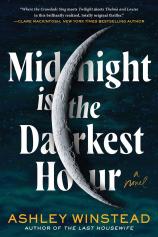Midnight Is the Darkest Hour
Review
Midnight Is the Darkest Hour
In some ways, MIDNIGHT IS THE DARKEST HOUR at first seems to hit many clichés that we might find in a murder mystery set in a tiny town in the southernmost point of Louisiana: a fundamentalist Baptist Church with hypocritical parishioners and an even more hypocritical preacher; a steamy, alligator-filled atmospheric swamp; a "bad boy" best friend; and a naive protagonist. But Ashley Winstead takes all that and turns things upside down as we come to realize that in spite of her apparent naiveté, Ruth Cornier, the preacher's daughter, doesn't fit neatly into any of the slots in which the others in town have placed her.
"The ending, in particular, is a surprising twist that, after reflection, is perhaps the only way that this escalating series of events could have concluded. Yet we do not see it coming. At all."
The story is told in the "now" but also in flashbacks, all relating to Ruth's age and what is happening to her at certain points in time. Winstead takes us back to when Ruth was 17 years old and a cataclysmic event that changed the direction of her life. It is then that Ruth and Everett (or, as she refers to him, "Ever") begin to walk on a rebellious path together. But we also are privy to earlier incidents that shaped Ruth and her view of the world, or the town, around her.
Winstead parses out the information sparingly as we wonder just what secrets Ruth and Everett are keeping from each other. What we do know is that Ruth is at times an unreliable first-person narrator. While relating events that happened when she was a child, she doesn't understand exactly what they meant. However, other characters (and we) do grasp their significance.
Ruth and Everett are outcasts. Ruth is painfully shy and always worried about disappointing her father, the all-powerful preacher who is unquestionably the most important person in the small town, and whose desires are weightier and given more import than those of the sheriff. And while in some ways Ruth grows up sheltered by her father, she is also burdened by his expectations and rigid interpretation of what a daughter should be. She is not allowed to read novels or go to college. She must attend Bible study and summer Bible camp. Like her mother, she has to be obedient and not question her father or any other man.
Everett is the son of the town drunk and has been abused by his father his whole life. So it's an absolute understatement to say that he and Ruth make an unlikely couple. But both find their other half, their best friend, in one another. And their belief system is very much based on what they see and experience in a town where everyone has ceded all independent thought to the morality police --- Ruth's father.
In this story of good versus evil, Winstead leaves us gasping as we struggle to figure out just who and what we think is good and what is evil. All our assumptions about right and wrong are thrown to the winds as a number of characters are ultimately revealed to be not what they appear to be in many ways.
When people cling to their belief that they are superior in every way because of their rigid, righteous religiosity, they believe that others are not worthy of being treated with common decency. Those are lesser beings who can be ridiculed, used and abused. Winstead tears away the mask of these phony prophets and shows the bestial animals who hide beneath --- greedy creatures who care only for worldly possessions and power.
The ending, in particular, is a surprising twist that, after reflection, is perhaps the only way that this escalating series of events could have concluded. Yet we do not see it coming. At all.
Reviewed by Pamela Kramer on October 6, 2023




